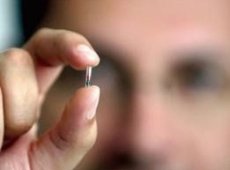New publications
Microchip implant created that tracks cancer cells
Last reviewed: 30.06.2025

All iLive content is medically reviewed or fact checked to ensure as much factual accuracy as possible.
We have strict sourcing guidelines and only link to reputable media sites, academic research institutions and, whenever possible, medically peer reviewed studies. Note that the numbers in parentheses ([1], [2], etc.) are clickable links to these studies.
If you feel that any of our content is inaccurate, out-of-date, or otherwise questionable, please select it and press Ctrl + Enter.

The microchip monitors oxygen levels, which are an indicator of the tumor's condition.
The traditional measure in the treatment of cancer is surgical intervention. However, not all tumors can be eliminated by surgery. If the tumors are located in close proximity to the brain or liver, there is a risk of damaging the surrounding tissue and nerve cells. And in the case of slowly growing tumors (say, prostate cancer), which appear mainly in older people, there is a serious threat to life.
The development of inoperable tumors must be constantly monitored in order to counteract them in time. Currently, computer or magnetic resonance imaging and other similar technologies are used for this purpose.
A group of German scientists from the Technical University of Munich (TUM) led by Professor Bernhard Wolf proposes observing from the inside, not the outside. The specialists have designed a sensor and placed it, along with auxiliary electronics, a radio transmitter and batteries, in a biocompatible plastic shell. The resulting device, about 2 cm long, is implanted in the body near the tumor and measures the concentration of oxygen dissolved in its tissue.
The main difficulty was to create a device that could do its job completely autonomously and for a long time. It was also important that it could operate in the presence of protein and cellular "garbage" and not be perceived by the body as a foreign object, says one of the project participants, Sven Becker.
The developers have successfully completed their task: this has been confirmed by laboratory experiments. Now they are searching for suitable patients for clinical trials. In the future, the engineers intend to add other sensors that record the temperature and acidity of cancer cells, as well as a mechanism for introducing small doses of chemotherapy drugs as needed.
The German authorities have allocated €500,000 for this project, which is called IntelliTuM (Intelligent Implant for Tumor Monitoring).

 [
[